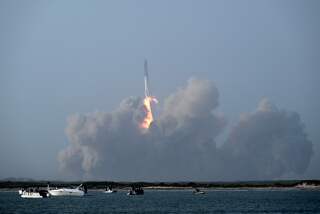Liftoff to Where?
- Share via
Americans watched a wounded friend get up and run again Thursday, this time aware that hundreds of things can go wrong in the crucial liftoff of a space shuttle, this time mixing their cheers with sighs of relief.
This time, too, people watching the launch on television understood clearly that not only five veteran astronauts but also the very future of America’s manned space program was riding on the shuttle Discovery when it thundered through a scattering of pillowy clouds on its way into orbit.
One successful launch nearly three years after the tragic explosion of the shuttle Challenger that killed seven astronauts does not guarantee a future for space research. But it makes it possible to talk about it again without calling up the chilling image of Challenger’s long fall in January, 1986.
The talk must begin with the fact that Americans have done best in space when they have focused on a mission--the Apollo flights to the moon being the outstanding example. It took months, even after the Challenger accident, to realize the degree to which the National Aeronautics and Space Administration and its contractors had gone slack in the years after the moon shots.
That leaves the question of the mission, or the assortment of missions, on which America wants to focus. Does the United States need a space station? If so, should it be a luxury model or a subcompact? Should the nation go for an outpost on the moon, as former astronaut Sally Ride has suggested? A trip to Mars is the next great space adventure for Earthlings, but it will cost money--even if Washington and Moscow could agree to share both the costs and the glory. Can the United States afford to invest billions of dollars in a space station and still have money left for a Mars landing? Or must the nation choose between them? Indeed, does the imperative to explore space to the full extent of its capability leave the nation a choice?
Or is the national debt now so enormous that financing space programs must be weighed against expanding education and health programs because there is not enough money to go around?
Our sense always has been that exploring space is so important, so potentially crucial to human progress, that ways must be found to do the job. In fact, there is more than one logical answer to all of these questions. And what the nation will do about its future in space will involve politics and technology as well as money--just the kind of situations that voters thrust on presidential candidates every four years.
Anything that America starts to do in space today will not be finished for years--in some cases not even in the present century. So the decisions must be made soon. Fortunately, there still is time in this year’s campaign for both of the candidates to start discussing space policy, perhaps in greater depth than they have granted to other issues.
More to Read
Sign up for Essential California
The most important California stories and recommendations in your inbox every morning.
You may occasionally receive promotional content from the Los Angeles Times.










